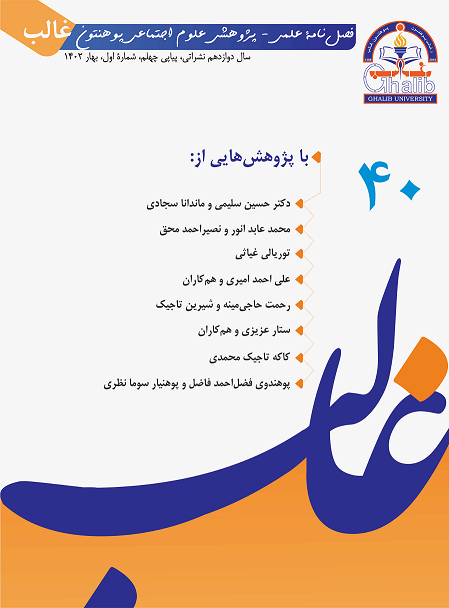Turkey's role in Afghanistan's political and security developments
DOI:
https://doi.org/10.58342/ghalibqj.V40.I1.5Keywords:
Role of Turkiye, Foreign Policy & security, AfghanistanAbstract
Turkey, as a regional power and NATO member, has played an active role in Afghanistan's developments in recent years. In fact, after the US-led coalition attacked Afghanistan in 2001, Turkey has been active as a NATO member in the civilian sphere in Afghanistan, and after the withdrawal of the US and NATO, it has tried to maintain its influence in this country. In this regard, the main question of the artıcle is, what has been the role of Turkey in the developments of Afghanistan? This research has been done using the qualitative method and the application of role theory.The hypothesis of the thesis is based on the fact that Turkey's role in Afghanistan has fluctuated based on the role model between developer (as a member of NATO) and mediator (as an independent actor in the peace process) based on the internal situation of Afghanistan and external conditions. In addition, the findings of the research show that Turkey's role in Afghanistan, despite changing the methods and means of cooperation, is based on maintaining Turkey's influence in this country as a sign of Turkey's regional power components and a tool for political bargaining with It has been the West, especially US.
References
آریانفر، عزیز. (1383). افغانستان و جهان، یک کشور آسیایی، آفریقایی و استرالیایی. جاول. کابل: مرکز اطلاعات استراتیژیک وزارت امور خارجۀ جمهوری اسلامی افغانستان.
گوهریمقدم، ابوذر؛ مددلو، رامین. (1395). «نوعثمانیگری در سیاست خارجی حزب عدالت و توسعه». ایران: پژوهشهای راهبردی سیاست. 5(17), 121-143. .
Altunışık, M. B. (2009), "Worldviews and Turkish Foreign Policy in the Middle East", New Perspectives on Turkiye, P:40.
Aras, B. (2012). Example of Turkiye’s Mediation: Afghanistan Case. Center For Strategic Research.
ATASE, ATAZB, K:38, G:17, B:17-1, Onis, Z. (2007). Turkish Politics in a Changing World Global Dynamics and Domestic Transformation. University Press
Aydın, M, Gürcan, M, CMI Report R 2019, Turkish foreign policy: Structures and decision-making processes :3
Aydogan, M, 2021, Turkiye’s long involvement in NATO mission in Afghanistan , https://www.aa.com.tr/en/asia-pacific/turkey-s-long-involvement-in-nato-mission-in afghanistan/2279062#:~:text=After%20becoming%20a%20member%20in,and%20stability%20for%20some%20time.
Bayur, H. (Nisan-1948). Nadir Şah Afşar’ın Ölümünden Sonra Osmanlı Devleti’ni İran’a Kışkırtmak İçin Yapılan İki Deneme. Belleten, C.7, Sayı:46.
Bingul, O (25, may,2022) interwiev.
Breuning, M, (2011), Role theory research in international relations State of the art and blind spots,17-37
Burke, P.J. & Reitzes, D.C. (1981) “The Link between Identity and Role Performance,” Social Psychology Quarterly, 44(2): 84.
Cankorel, B, (5 jun 2022), Interwiev.
Chafetz, G., Abramson, H., and Grillot, S. (1996) “Role Theory and Foreign Policy: Belarussian and Ukrainian Compliance with the Nuclear Nonproliferation Regime,” Political Psychology, 17(4): 733.
Cupolo, Diego (2021), “Under Biden, US-Turkiye Relations Face Delicate Balancing Out”, Al-Monitor, 20 January 2021, https://www.al-monitor.com/originals/2021/01/turkey-us-biden-relations-nato-s400-syria-erdogan-blinken.html
Davutoğlu, A, (2001), Stratejik Derinlik, (İstanbul: Küre, 45-90).
East, M.A. (1973) “Size and Foreign Policy Behavior: A Test of Two Models,” World Politics, 25(4): 556–76.
Fuller, G, (2004), "Turkiye's Strategic Model: Myths And Realities", Washington Quarterly, Vol. 27, No. 3. pp. 52.
Gönlübol, M. S. (1990). Atatürk ve Türkiye’nin Dış Politikası (1991-1938). Ankara: Atatürk Araştırma Merkezi Yayını, s.20
Hale, William , Turkish Foreign Policy 1774-2000 (London: Frank Cass Press, 2000).
Halil, B. (2002). “Afganistan-Türkiye İlişkilerinin Başlıca Yönleri”, Afganistan Üzerine Araştırmalar, Ali Ahmetbeyoğlu (der.). , İstanbul, Tarih ve Tabiat Vakfı (TATAV) Yay,, s.276.
Hollis, M. and Smith, S. (1990) Explaining and Understanding International Relations, Oxford: Clarendon Press.
Holsti, K. (1970). National role conceptions in the study of foreign policy. International Studies Quarterly,, 14(3), 233–309.
http://www.heartofasia-istanbulprocess.af/h
https://en.wikipedia.org/wiki/Organization_of_Turkic_States
https://web.archive.org/web/20160103042552،/
https://www.hoa.gov.af/political-consultation/ministerial-conferences.htmlurl،
https://www.hoa.gov.af/political-consultation/ministerial-conferences.htmlurl،
https://www.mfa.gov.tr/synopsis-of-the-turkish-foreign-policy.en.mfa
https://www.deik.org.tr/uploads/afganistan-ulke-bulteni.pdf
https://www-aa-com-tr.translate.goog/en/asia-pacific/Turkiye-s-long-involvement-in-nato-mission-in afghanistan/2279062?_x_tr_sl=en&_x_tr_tl=tr&_x_tr_hl=tr&_x_tr_pto=sc
Kaplowitz, N. (1990). National self-images, perception of enemies, and conflict strategies: Psychopolitical dimensions of international relations. Political Psychology, 11(1), 39–82
Kaya, K. (2013). Turkiye’s role in Afghanistan and Afghan stabilization. Military Review, p:23.
Kültür Bakanlığı Yayınları, 1981, Atatürk'ün milli dış politikası: Milli mücadele dönemine ait 100 belge, 1919-1923. 1,
Murrison, A. (2006), Strategic doctrine of Turkish foreign policy, Middle Eastern studies, V, 42
Nabers, Dirk, 2011 , Identity and role change in international politics,P: 82
Nasr, V. (2006), “The Shia Revival: How Conflicts within Islam Will Shape the Future” the Voice for Ethnic Carnegie Council for Ethics in International Affairs
Onis, Z. (2007). Turkish Politics in a Changing World Global Dynamics and Domestic Transformation. University Press.
Oran, B. (2002), Türk Dış Politikası, Kurtuluş Savaşından Bugüne Olgular, Belgeler, Yorumlar, Cilt I, 6. Baskı, İletişim Yayınları: İstanbu
Özlü, H. (2012). Türk-Afgan Dostluk Ve İşbirliği Anlaşmasi” Kapsaminda. Uluslararasi Avrasya Sosyal Bilimler Dergisi Yıl:3, Sayı:8, 32.
Ramani, Samuel, (2018), Can Turkiye position itself as the most effective mediator in afghanistan? https://www.trtworld.com/opinion/can-turkey-position-itself-as-the-most-effective-mediator-in-afghanistan--15883
Uslu, E. (2009), AhmetDavutoglu: The man behind Turkey’s assertive foreign policy, Eurasia Daily monitor, V.6, N.57
Wallace, H, (2021), With NATO and pan-Turkism in mind, Turkiye makes its move in Afghanistan, Tactics Institute https://tacticsinstitute.com/eurasia/with-nato-and-pan-turkism-in-mind-Turkiye-makes-its-move-in-afghanistan/ Tactics Institute
Wanning , M & Tuncay k. (2011). “Impact of changing Islamic identity on Turkiyes new foreign policy. Turkish journal of international relations, summer-fall, N.2 –
Wendt, A. (1999) Social Theory of International Politics, Cambridge: Cambridge University Press.
Wish, N.B. (1980) “Foreign Policy Makers and National Role Conceptions,” International Studies Quarterly, 24(4): 532–54.
Yavuz, M. H, (2020) The Neo-Ottoman Foreign Policy of the AKP Pages179–202 https://doi.org/10.1093/oso/9780197512289.003.0008.
Downloads
Published
How to Cite
Issue
Section
License
Copyright (c) 2023 ghalib quarterly journal

This work is licensed under a Creative Commons Attribution 4.0 International License.













